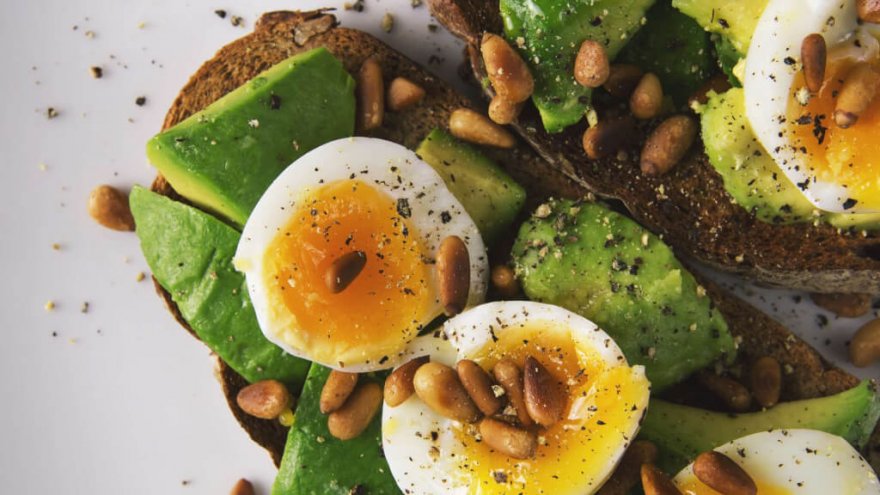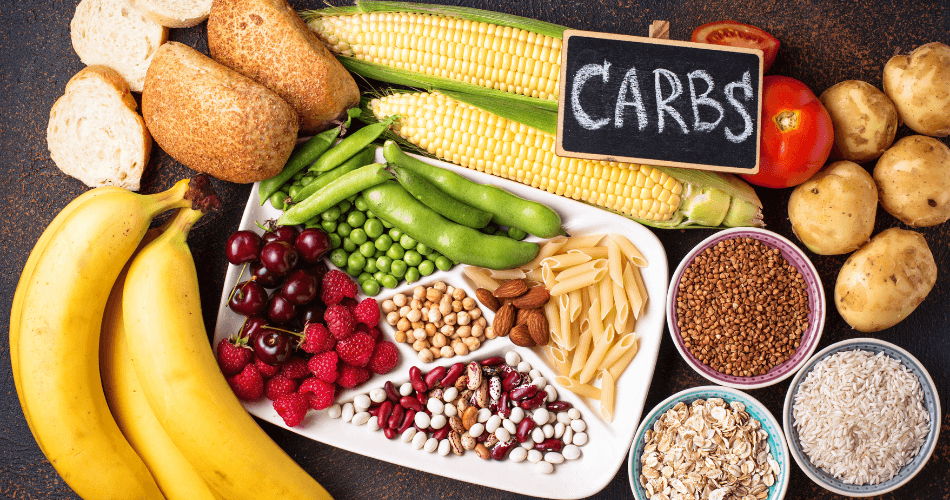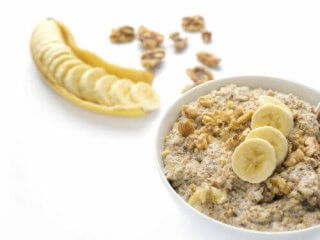Pre-Race Meals: Nutritionist’s Guide On What To Eat On Race Day

A common concern of many runners is what to eat on race day. This holds true whether you are racing first thing in the morning or if your race is at an unusual time.
As an afternoon runner, I don’t struggle with fueling when a race is held in the evening. Most of my friends, however, do. Lucky for them, most races take place in the morning!
There are always questions on race meals if you are taking part in a relay such as Ragnar. In Wisconsin, where I live, there are other relay-type races such as S’more 24 (where your team runs as many laps as they can in 24 hours) and the Door County Fall 50, where 5 teammates take turns running to cover the 50 miles.
It doesn’t matter what type of race day fueling you need help with; we have answers for you! We turned to Megan Robinson, nutritionist and running coach, for some expert advice.
Amount of Carbs Recommended for Races Longer than 2 hours
It’s recommended to eat about 1-4 g of carb per kg of body weight in the 1-4 hours from your race time. This may seem like a huge range, but it all depends on the amount of time you have to digest your food and what you can typically tolerate before racing.
Remember, racing intensity is higher than during typical training runs, so stick to quickly digesting carbs to avoid GI issues.
How Many Hours Before a Run Should You Eat?
When determining how many hours to eat before a run, it depends on how far you need to run and what type of effort you plan to put in. When going on a casual 3-5 mile run with friends, you can eat something small 45 minutes to an hour before the run. For me, this is typically a bowl of oatmeal or a bagel.
If I am racing a 10K or half marathon, I would eat that oatmeal a couple of hours before gun time, then have some type of bar about 30 minutes before the start.
According to Robinson timing your food correctly is crucial.
“Overeating too close to your race time can make or break your race performance. It would help if you left enough time to be able to digest your food so you don’t have any unwanted bathroom stops during the race.
Most athletes should eat their main meal 2-3 hours before race time to digest the food adequately. The further you eat out from race time, the larger the meal can be. However, if you want to sleep in and have only 1-2 hours to eat before race time, your meal size needs to be smaller.”
Carb Heavy Breakfast
We all know that most runners consume a carb-heavy breakfast on race morning. But are you wondering what exactly that looks like? If you want and need more specific advice on how much carbs you should consume, you can check in with our resident expert—knowing what to eat before a run can set you up for success!

Our resident Sports Nutritionist Megan Robinson has this advice:
Consider the following guidelines to help you time your meal and amount of carbs to eat 1-3 hours before your race.
🕣. 3 hours from race time: Eat 3 g of carb per kg body weight
🕣. 2 hours from race time: Eat 2 g of carb per kg body weight
🕣. 1 hour from race time: Eat 1 g of carb per kg of body weight
For example, if you plan to eat 2 hours before your race time and weigh 130# (59 kg), you may eat anywhere from 60-120 g of carbs. If you tend to run better with more carbs in the tank, choose the higher end by adding a sports drink to add extra carbs rather than eating a larger breakfast.
Just remember, carbs are the focus before races. Go easy on eating a meal high in fat and protein since they take longer to digest and may cause GI upset if eaten too close to race time.
What Is a Good Pre-Race Meal?

If you need solid ideas on what makes an excellent pre-race meal, friends in the running community are sure to have good ideas for you. Robinson has more concrete advice on this topic:
Robinson Discusses What to Eat for a Pre-race Meal
If you struggle with GI issues before races, you may consider using liquid nutrition rather than solids from a higher-carb sports drink or fruit smoothie, but make sure you have tested this out before race day.
Choose foods that are low in dietary fiber, protein, and fat that are more easily digesting:
- Oatmeal with a banana
- Bagel (plain) or white toast with a small amount of butter
- Chewy cereal bar (not protein bar) with fruit
- Banana pancakes or waffles with honey or fruit
- Fruit smoothie
What Should You Not Eat Before a Race?
Robinson reminds us: It’s suggested to avoid greasy, high-fat foods such as bacon, sausage, cheese, whole milk dairy, or foods high in dietary fiber such as bran flakes, whole wheat bread products, or high fiber protein bars.
In addition to her words of advice, I would caution you that many runners struggle with citrus the morning of a run. Some runners can’t imagine running without a morning cup of coffee, and others would not dream of drinking coffee on race day. A lot of figuring out what to eat is trial and error on the part of the runner.
Whether you are searching for half marathon pre-race meals or 5K pre-race meals, the standard advice is the same. However, some people find they have more flexibility in their diet when racing a shorter distance. This is certainly true for me.
What Should You Eat the Night Before the Race?
So now that we have figured out breakfast let’s look at the night before the race. Many people find that a carb-heavy plateful for the evening meal is what works best.

I prefer to eat my big meal around 1:00 p.m. and have a significantly smaller meal later in the evening. With a gastrointestinal tract that struggles on race day, this works best for me.
In addition to a carb such as pasta, your protein should be low fat and easy to digest. My protein of choice the day before I race or run long is chicken. Things to avoid are large salads or high grain foods that might haunt you on the course.
Best On-Course Fuel
Now that we have covered pre-race food, we would be remiss to neglect the on-course fuel. When running for 60 minutes or more, many runners need to take in some calories. This can be liquid nourishment or actual food.
Honey Stinger makes my fuel of preference on the course. Although I prefer the waffles, the chews or bites are pretty darn good also.
What is most important is to eat something you have practiced with on the course to avoid possible problems.
Tracking & Sharing Recipes
One last thing to remember when building your training and nutrition plans is to keep track of your recipes so you can easily reference them for years to come. Or even share them with your training buddies.
This won’t be your last pre-race training, so why not keep your favorite recipes stored in a recipe app.
We love the team over at Morsel, as their recipe organizer app is fully customizable. Curate your recipes with categories, quickly edit them when you make recipe improvements, share your entire digital recipe book with your friends, family, and training pals, and even create stunning printed recipe books.
Latest Articles
 Is Running on a Treadmill Easier Than Running Outside?Runners have their own preferences, whether it is treadmill running, running outside on the road, or exploring trails. So...
Is Running on a Treadmill Easier Than Running Outside?Runners have their own preferences, whether it is treadmill running, running outside on the road, or exploring trails. So... Is It OK to Use Trail Running Shoes on the Road?While trail running shoes can be used on roads, especially in situations where a runner encounters mixed terrains or pref...
Is It OK to Use Trail Running Shoes on the Road?While trail running shoes can be used on roads, especially in situations where a runner encounters mixed terrains or pref... How to Fix Sore Quads After Running?Rest, ice, gentle stretching, and over-the-counter pain relievers can help soothe sore quads after running. Also, ensure ...
How to Fix Sore Quads After Running?Rest, ice, gentle stretching, and over-the-counter pain relievers can help soothe sore quads after running. Also, ensure ... 10 Fruits With The Most Electrolytes to Replace Sports DrinksThese fruits are high in electrolytes such as potassium, magnesium, and calcium, essential for hydration, muscle function...
10 Fruits With The Most Electrolytes to Replace Sports DrinksThese fruits are high in electrolytes such as potassium, magnesium, and calcium, essential for hydration, muscle function...

